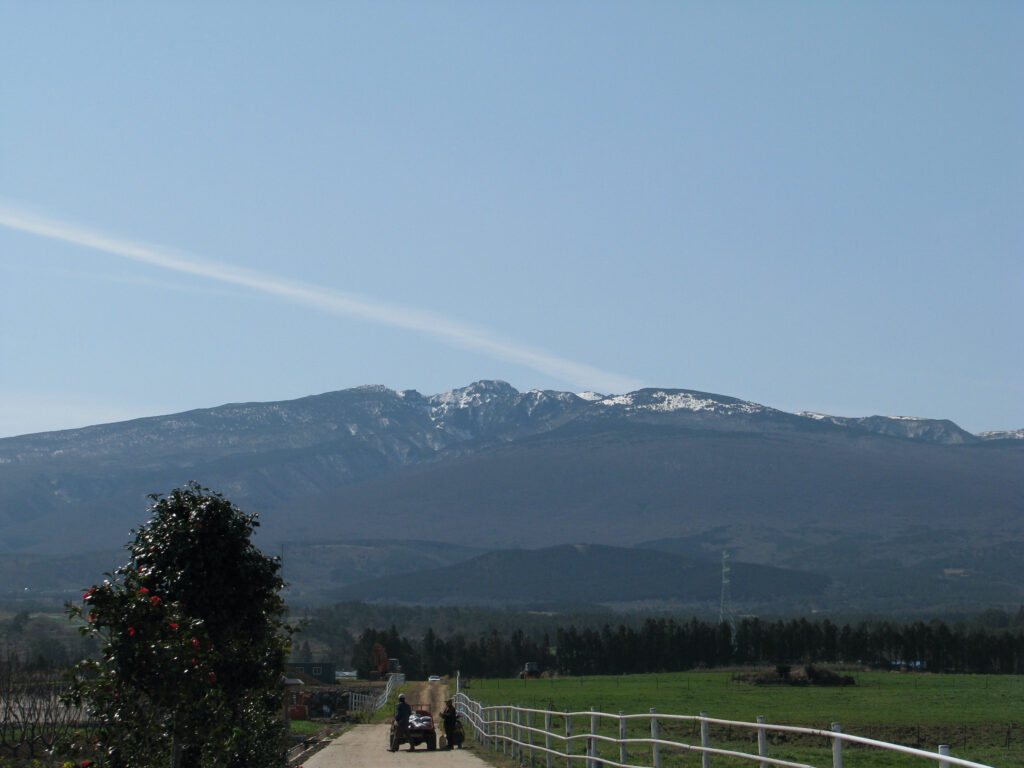Quelpart is the name formerly used by Europeans to refer to Jeju Island. This article was written by Malcom P. Anderson and published in Overland Monthly (San Francisco, California) in January, 1914. Transposed and edited by www.jeju.guru.
Late in the afternoon of an August day, accompanied by my Japanese interpreter, Ichikawa, and my Korean servant, King, I boarded a little steamer in the harbor of Mokpo, bound for the remote island of Quelpart, which lies off the southern coast of Korea.
Our craft, sailed by a Japanese skipper with a Korean crew, was a very old and rotten steamer which should have been scrapped ten years before. The boiler was so independable that it could not carry more than thirty pounds of steam, and the copper bottom was in such ill repair that it hung in loose ragged sheets. We noted these defects, but thought little of them, as in our hurry we did not care to take the only alternative means of transportation, a junk which would spend many days on the voyage.
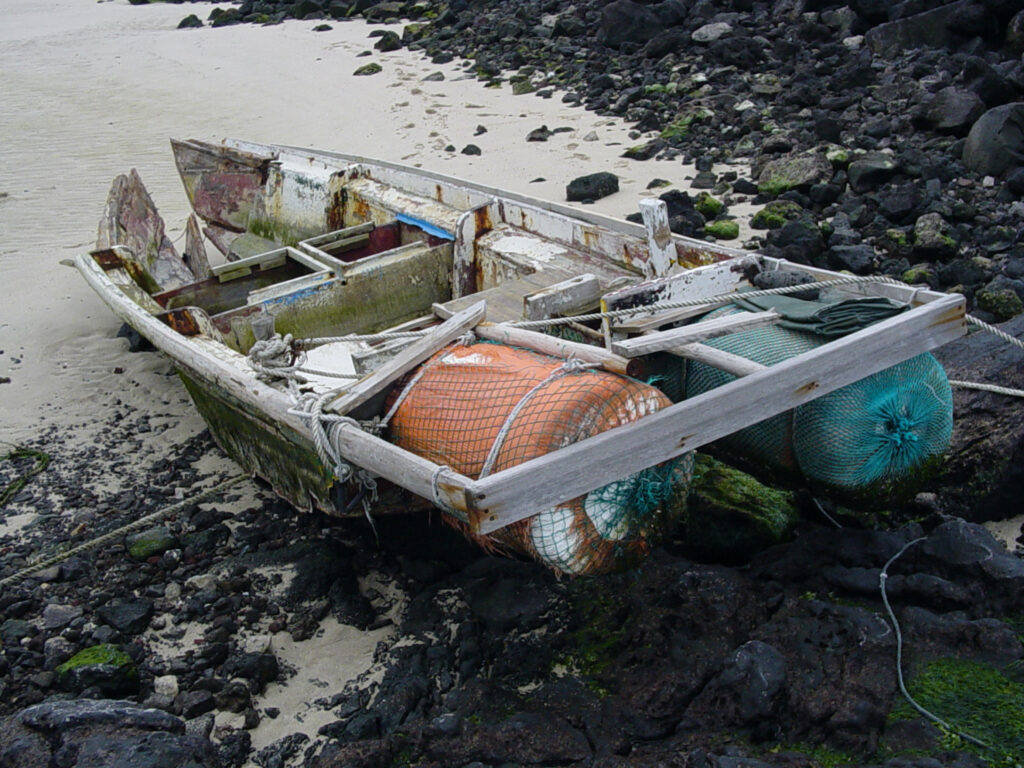
There was much delay before started. I stood on the top cabin feeling very impatient and watching the crowd of passengers peasants and petty merchants gathering abaft. These ragged and unkempt people filled the rear of the vessel completely; coal was heaped along the narrow deck passages, and the top of our little cabin was littered with blocks and cordage. I wanted to be out of doors that afternoon* and evening, and for a time I sat on the roof of the house, but as soon as we got under way the low boom was rigged for sail, which made my position impossible. I had no choice but to remain in our room. As Ichikawa and I were the only passengers with cabin tickets, we had the whole of the house to ourselves. This was lucky, as there was no room for anybody else, for the cabin was just six feet long and five feet high, with no more than width enough for two small men to lie side by side upon the floor. There was no berth, no furniture, but a fire box, and even this we found in our way when we spread our blankets that night.
We spent the evening sitting on the floor, occasionally rising to our knees to view from the port holes the bare islands among which we were passing, as we traveled southward through Washington Straits.
Both my companions had joined me but a few days before. Ichikawa, then a student at Tokio, had left his books for a time in order to have some experience with me. He was a slender youth of dignified appearance, model manners, and great integrity, but lacking somewhat in physical strength. King Ryosui (literally Gold Sea-Dragon), my Korean servant, was a youth, short of stature, with a face much marked by smallpox. He always dressed in Korean garb, and went hatless, as is the custom among married men. He spoke Japanese very well I had learned a little of that language, so could make him understand simple things, but in communicating with the natives I usually had to call upon Ichikawa.
During the evening, we called in one of the tradesmen, who was aboard, and I questioned him about the birds and mammals of Quelpart, for it was the object of my expedition to investigate the wild life of the island. The tradesman told us of deer, badgers and marten, and also described a number of birds, giving us to think that we would be successful in our search. This was gratifying to us, as the fauna of Quelpart was perfectly unknown.
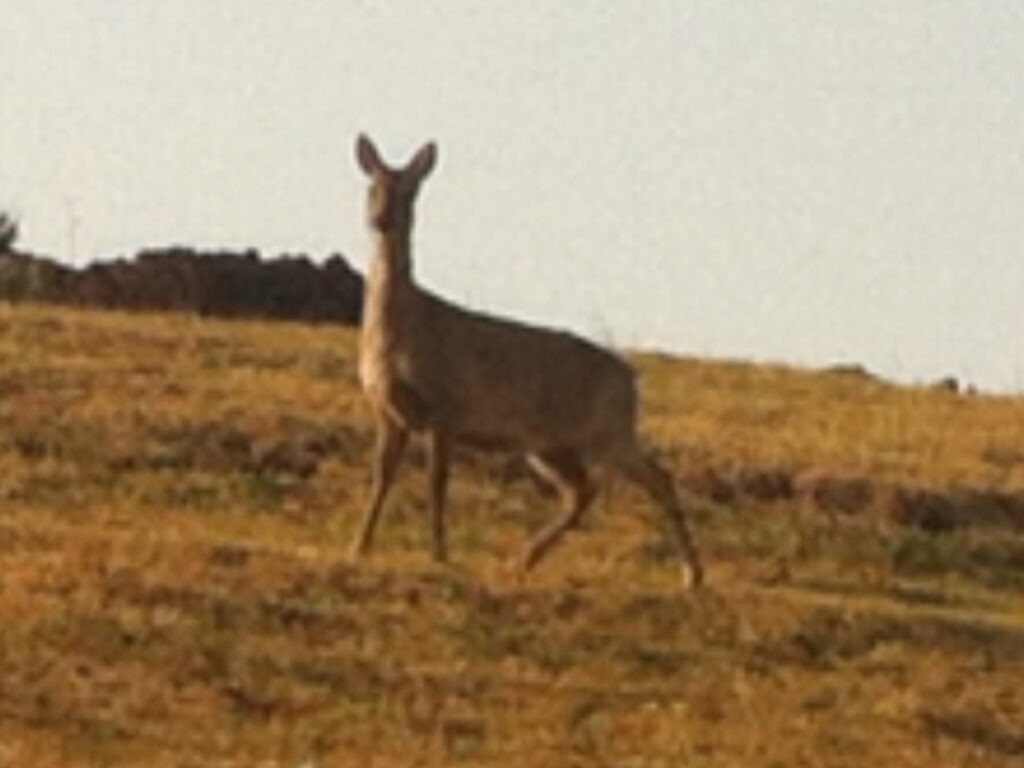
The night came on with a blustering wind, and our skipper, with commendable prudence, sought shelter soon after leaving the straits, in a cluster of little islands called So-an, or the Hamilton group. The wind spent itself before dawn, but morning found us still at anchor in quiet water. I was inclined to be vexed with the skipper on awakening, but on looking out I found we were in a dense fog. As the sun grew in strength the fog dispersed and showed us the high, rocky islands which had sheltered us. They were treeless, but greener than the islands passed the evening before, and seemed uninhabited.
Our slow boat proceeded some hours before I sighted Quelpart. The indication of its position was the mass of clouds hanging about the high mountain. Then came into view the gradual slopes of the base of the mountain, and at length when we got quite near, I distinguished the hamlets scattered near the coast, the stone walled, cultivated fields, and the capital city, Chyoi-jyu, surrounded by its wall.
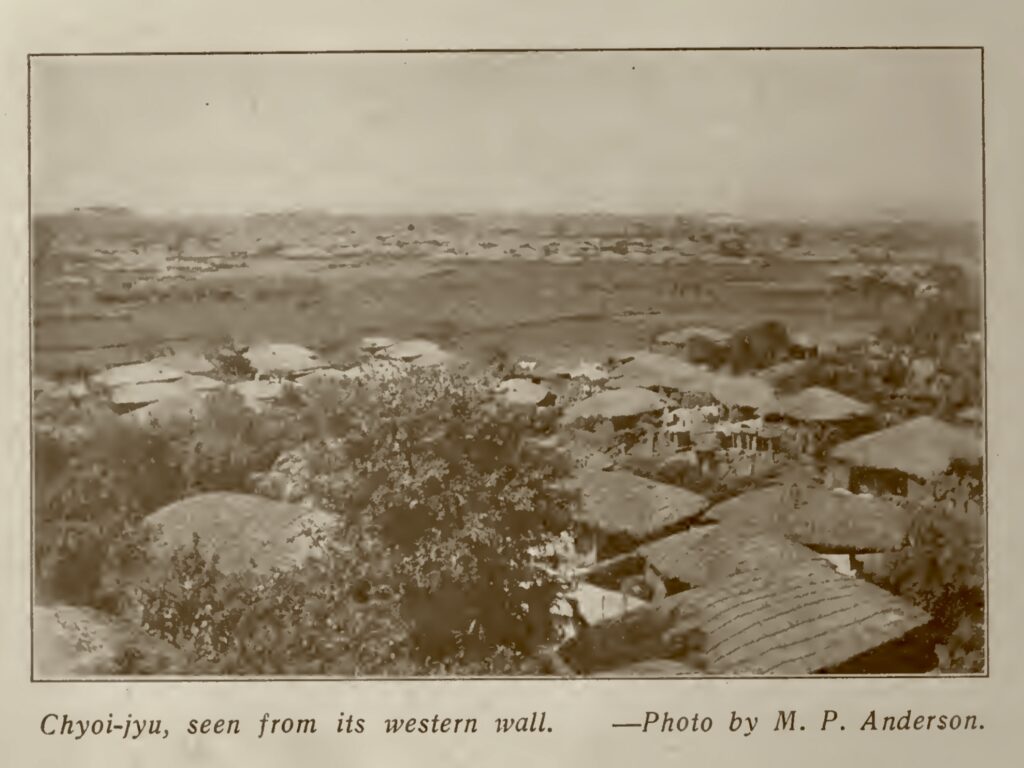
We dropped anchor off the shore of Quelpart – there is no harbor deserving the name – and as we carried no boat, we tried to attract the attention of the native boatmen by repeated blasts on the steam whistle. It was a long time before there was any response, but at last a sampan came out and took me to land, with a number of native passengers. We landed on a stony shore, and while a larger boat wei.t for my heavy boxes, my servants and I remained there with my guns and hand baggage. crowd of men and boys soon gathered about, and a number of women, bolder than their sisters of the Korean Peninsula, peered over the stone walls which enclosed their back yards.
The men and boys that gathered on the shore of gray boulders were very inquisitive. They came asking me questions, also feeling of my garments and leather boots, which they admired greatly. They themselves were all dressed nearly alike in loose jackets and baggy trousers of white home-spun cotton, bound round at the ankle, sandals of straw and stiff high-crowned hats of bamboo fibre.
We got our boxes ashore through the slight surf on the backs of the boatmen, and then called on the workmen in the crowd to carry them into town. Owing to the dialect of the island, King had some difficulty in making my wants understood. For some time we were unable to find anybody who would act as porter. There was a great deal of loud talking, but no action, until suddenly a big, dirty coolie rushed at my ammunition box, struggled with it, got it on his back, and started off. This was the signal a for scramble, almost a fight, in which might soon prevailed, and the biggest fellows shouldered my property.

We had landed near the mouth of a small stream, up the bank of which we now followed to reach the eastern Chyoi-jyu. Numbers of bronze shouldered women and girls were washing clothes in the pools. They were startled at seeing a foreigner so near, and kept their eyes cast down until I had passed, when they all stood up and looked at me.
The brook formed a sort of moat on this side of the city. Turning to our right, we crossed it by a stone bridge and entered the large, rude city gateway of uncut volcanic stones piled together without mortar. The narrow, crooked street in which we then walked, led between low huts of rough stones, plastered with mud and roofed with heavy thatch tied down by a net work of large straw ropes. Such a measure is very necessary, for the winds of Quelpart are mighty.
We went to the house of a Japanese inn-keeper who had solicited my patronage, representing that his place was much cleaner than any Korean inn. This was no doubt true, but the inn was merely one of the crude native huts slightly modified to suit Japanese ideas. There was a small entrance hall with no floor, a general room with the floor raised some eighteen inches above the ground, a single guest room opening off this, and in the rear the smoke blackened shed that answered as kitchen. The landlady, who was a very affable young Japanese woman, greeted us with low bows and showed us the guest room, which was not much larger than the cabin on our boat. The walls had been newly covered with white paper, and on the floor was good matting. There was no furniture – we needed none.
That afternoon I went for a walk, and explored some of the alleys that answer for streets. I found them all alike, small stone huts, and unspeakably filthy. Coming near one of the city gates, I went into the country and wandered about the stone walled fields. I gazed long on the mountain, Hal-la-san, cleft down the side with a tremendous canyon. On the evening of our arrival at Chyoi-jyu I made some inquiries as to conditions from a Japanese, police officer, who received me with hospitality. As he claimed to have control over the working men, I was glad to let him get me some coolies to carry my outfit up the mountain, where I wished to camp. The next morning several porters assembled at the officer’s place, and I met them to arrange wages.
In coming to an agreement with such people one needs to exercise great patience and good nature. They wanted double wages at first, but I stood out and offered a small wage, expecting to raise my sum about as much as they came down in their demands, as is the custom in Asiatic bargaining. We had some trouble in bringing them to reason, till after nearly half an hour of haggling the officer became exasperated at the spokesman’s conduct, and struck the big fellow a resounding blow on the cheek. The coolie rubbed his face with his sleeve, and promptly agreed that they would go for a sum equal to about fifty cents per man. Even this was a pretty high wage for that country, but as the officer explained, they were all lazy fellows, who would rather loaf in squalor than work and keep decent.
Shortly after 9 a. m. we left the southern gate of Chyoi-jyu, preceded by three coolies with my things on their backs. From the first we began to climb slightly. We passed for some miles through lanes between stone walled fields of green crops of millet, sweet potatoes, cotton and buckwheat. Here and there in a favorable spot that could be irrigated, I noticed little fields of rice, but millet was the chief crop. Rice is consumed only by the well-to-do, and is almost all imported from the mainland.
Many peasants were at work in their fields, and as the sun was hot, they had their jackets open, exposing their bronze chests, and their trousers rolled up about their thighs. Their heads they covered with immense lowconical hats woven of thin wood shavings. These people came to the walls of their fields as we passed, for such a sight as a white man had seldom or never come before their eyes. As most of the people live quite near the coast, where the soil is better, we saw but few houses those we passed were just hovels of two or three rooms, with a cowshed and a chicken-coop, and most important to the Quelpartan, a pig-sty in close proximity.
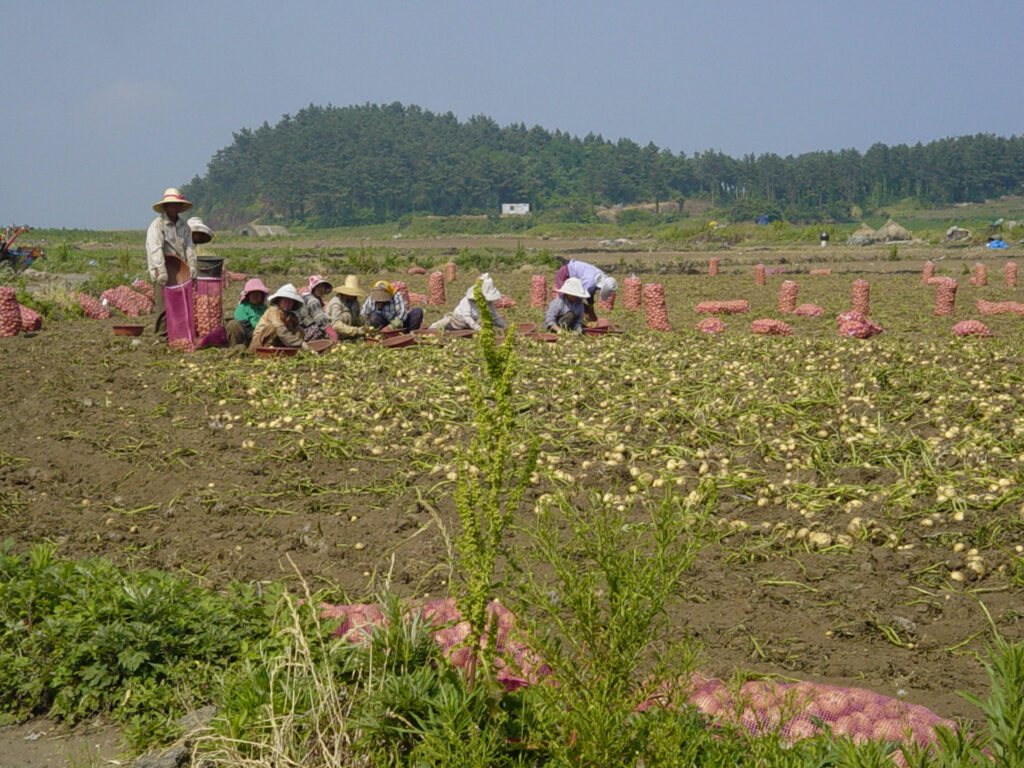
The day was sultry, the sun in full blaze, and my packers moved very slowly. Unlike their brothers of the Peninsula, these people are not much used to carrying burdens. Had I realized this earlier, I should have waited in the city until I could obtain pack animals, but these were all ranging up high on the sides of Hal-la-san, and it would have taken two days to send men to bring them down.
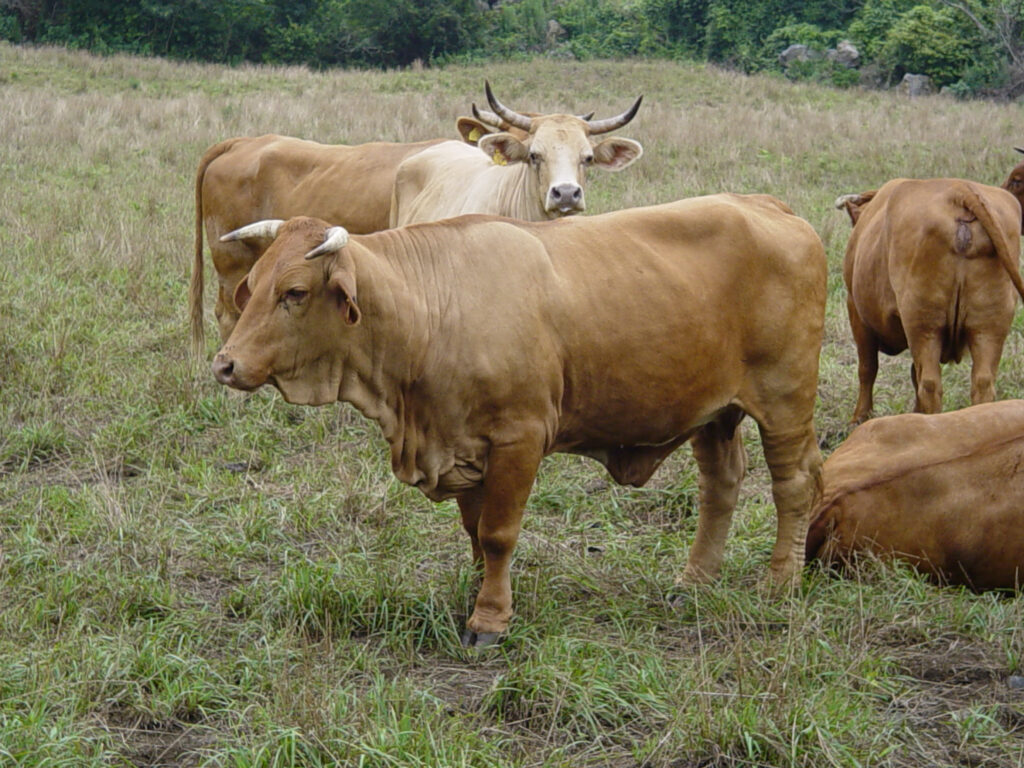
When at last we reached the upper limit of the walled field, we came upon steeper and less regular slopes, chiefly uncultivated, but grown with grass and here and there patches of bushes. This grassland, forming a belt some miles in width, separates the cultivated country from the fully forested mountain. It is used for the pasturage of cattle and ponies, which are the chief product of the island. As we traversed this pastureland, we saw several herds of cattle of a small, hardy-looking variety. One herder with a peculiar high-crowned, broadbrimmed hat of coarse felt, probably obtained from his own cattle, approached us and addressed me. When he found that I could not understand, he was much amused. I doubt if it had ever occurred to him that there might be another language than his own. He was a good natured boor, determined to make the most of his opportunities to learn, for he followed us some distance, plying King with questions. He certainly had a new subject for conversation when he returned to his companions.
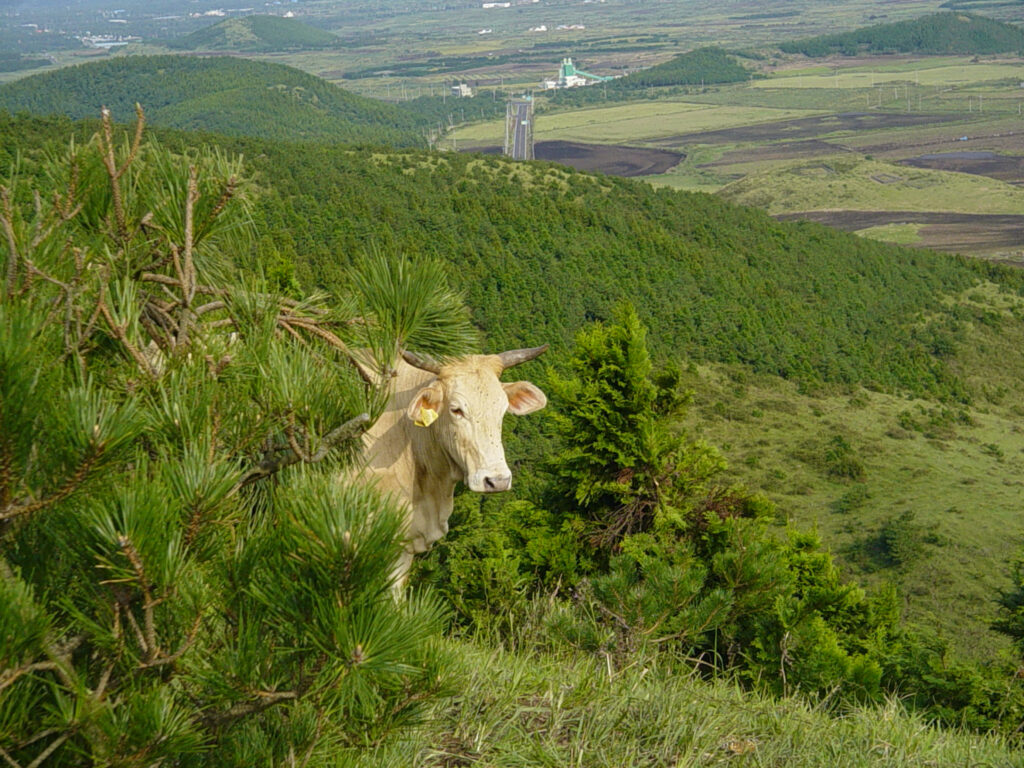
About the middle of the afternoon we reached a small group of huts near the border of the forest, and situated on the brink of the tremendous gorge, which splits the mountain. After some reconnoitering for a favorable camping place, which I failed to find, we dismissed the porters, and hastily pitched a tent beneath a dead tree in the open below the huts.
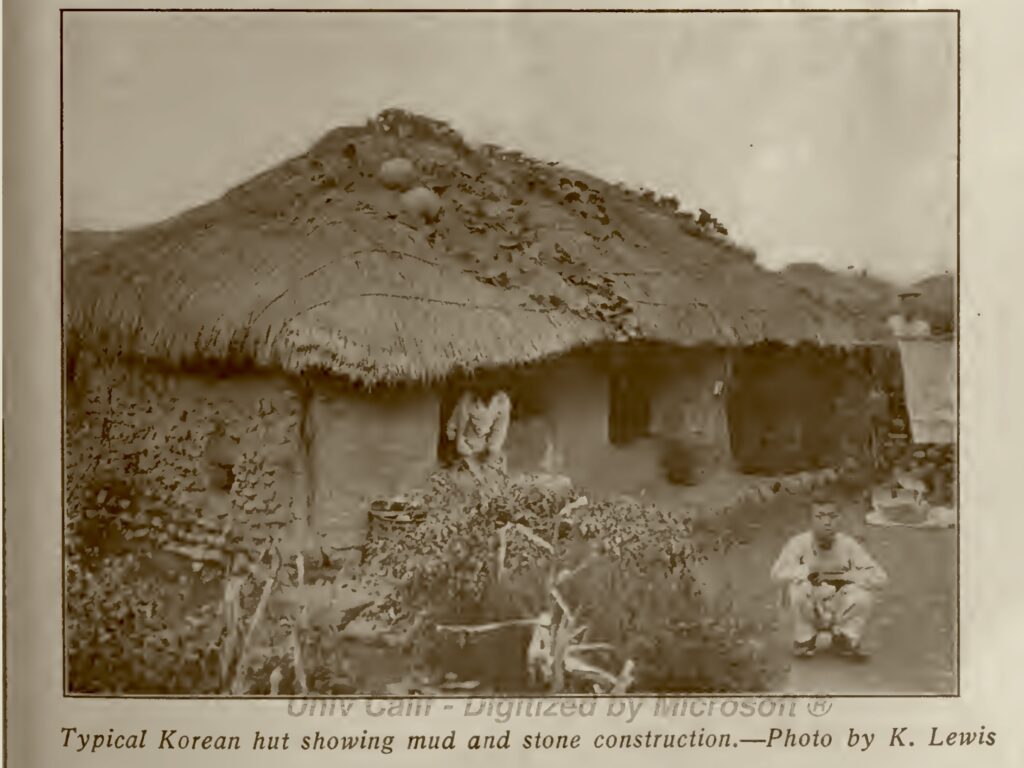
I made a great mistake the morning in not searching for a good camping site, and putting up my tent in a permanent manner. I was anxious to get all my things together on the mountain before beginning to work, so King and I went back to the town. On our return late in the afternoon, a heavy wind and rain began. We reached camp not only tired and hungry, but drenched to the skin. We were looking forward to a satisfying meal, for I had left some directions with Ichikawa to gather fuel and set a pot of bacon and beans boiling. Camp looked desolate upon our approach; there was no fire burning. To my dismay, I found Ichikawa sitting in the tent, doing nothing. There was not a stick of wood gathered, not a morsel cooked. Many of the things were lying out in the storm, and the lower edges of the tent were blowing in the furious wind, which threatened to carry away at any moment our only shelter.
I was strongly inclined to be angry with my assistant, but remembered in time that he was a youth without experience, and accepted his explanation that he was not feeling well. I left him to sit in idleness, while King and I secured the edges of the tent and cooked our meal of boiled rice in the pouring rain. All that night, the next day and the second night, the storm continued without abating. On account of the poor manner in which tent was our pitched, it was not proof against the torrents of rain, and I scarcely slept for fear it would be torn from over us by the great wind. We had put a thick layer of boughs on the ground to lie upon, but so much water ran under that we almost lay in the mud. For lack of room in the tent I was obliged to leave some of my provisions out under a canvas during the first night, and they got drenched, especially the sack of flour. The wet soaked into this about an inch all over, forming a layer of dough, which afterwards dried, leaving the inside flour in good condition except for a great many lumps, which we had to pick out, as we had no sifter.
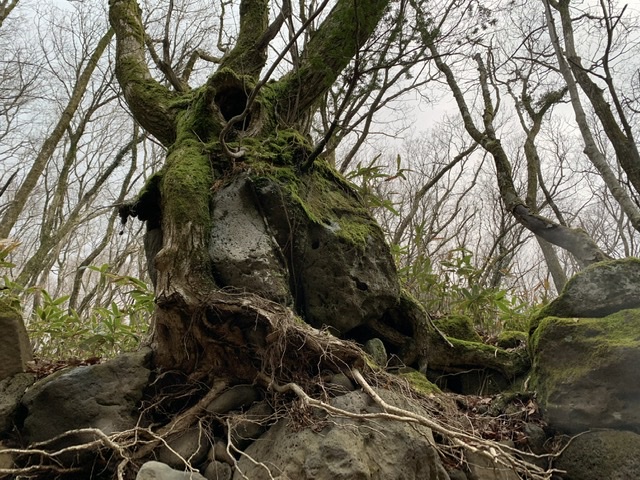
We were all quite wet after the first night. King kept his good natured smile, but Ichikawa looked thoroughly glum and said very little, though I tried to cheer him with songs and stories of camping experiences in America. During the first day of the storm, I constructed a rude stone stove inside the tent, with the idea of drying things out and doing some cooking. The resulting smoke was bad, but we liked it better than cooking in the rain.
Alter about forty hours of storm the wind and rain slackened, and we took the opportunity to move our camp to a deserted hut, which stood near the dwellings. It was a dark, damp hovel of stone walls and thatch, with eaves so low that we had to stoop to enter. The floor was but the earth packed hard, and it was wet, for a great hole gaped in the roof. Some little enclosure that had once been sleeping rooms, opened on one side, but they were too dark and damp to be habitable. With all these drawbacks we still thought we could keep drier there than in our tents, and we had better protection from the wind. Our first act was to cover the floor with a layer of boughs and build a large fire in the middle of the room to dry ourselves out.
Foggy weather followed the storm, but this did not hinder my work so much, so I set out a large number of animal traps near the edge of the forest, and spent my mornings in search of the birds of the island.
The peasants near whom we lived, a family of husband, wife, several children, grandfather, and grandmother, were very curious about me, but very good to us, too. They used to stand before our door when I was eating, and watch every motion I made. These people lived by cultivating some little patches of stony land, where they raised only potatoes the size of of walnuts, but of very good flavor. The family had several cattle, the small son herding them daily on the mountainside, and in a sty they kept the swine, which are invariably found among the Quelpartan’s possessions. The women of the place were very shy, and pretended great fear of me.

When they saw me passing they used, usually, to retreat into their hut, close and bolt the door behind them, and then peek out through a hole in the paper window. This I knew, because could I generally see an eye at the hole.
Before I had gotten well started with my work, we all began to experience ill health, on account of the hardships we had undergone. King was taken with a bad chill, and for several days the poor fellow’s moaning made me think that he was a great deal worse than he really was. A big boil developed on my thigh, and I walked only with great pain, but nevertheless I tramped about the mountains in search of a better camping site. I soon found that my choice was restricted, for I could find water only in the great gorge that I have mentioned. All that had fallen, as rain, had run right off into the sea.
Finally we moved camp into the forest at an elevation of 3,000 feet, or about 1,000 feet higher than the old hut. Here we were at the bottom of the great canyon, at a point where a tributary gorge joins it. With a view to thorough drainage when rain should fall, I pitched camp on a high point of rock at the joining of the two water courses. These were dry beds of rock at the time of our move, but two days later they were torrential streams. Just where our camp was, the canyon bottoms were several hundred feet wide, and not very steep, but above and below were narrow gorges, mere beds of tumbled boulders, over which the water made wonderful cataracts after the clouds burst on the mountain. The sides of the canyon were many hundred feet high, but not too steep to climb easily. In some places the forest was open, in others it was almost impenetrable. When once we gained the summit of the gorge wall the general slope of the mountain was found to be easy and the woods were more often open.
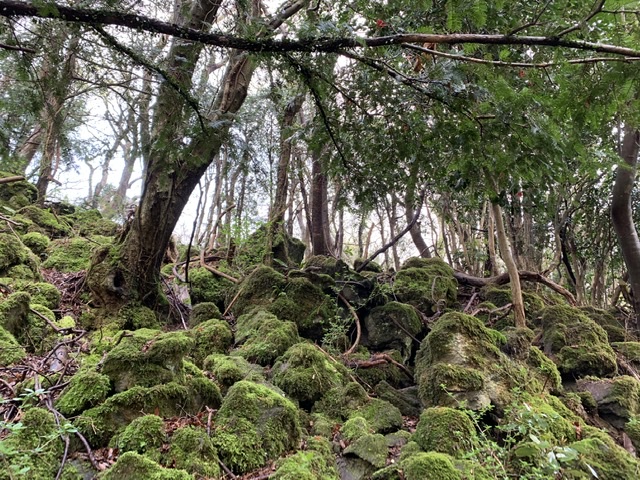
Still other storms swept the mountain and rain poured down upon us. In this deep ravine we were comparatively well protected from the wind, but we could hear it blowing a tremendous gale across the canyon top, and occasionally a strong eddy swept down the gorge and beat our tent angrily.
The wood in the forest was nearly all wet through, even the dead boughs we pulled off the trees were soaked. What lay on the ground was as much water as wood. Never before had I had such difficulty in starting fires, and it was almost equally difficult to keep one going when started.
One day I was at the hovels where I had lived, and asked the old grandfather if such weather as we were having was common to Quelpart. “No, indeed,” he replied. “How much longer do you suppose it will last?” “Until you leave the island.” It is true, the stormy weather commenced the day after I went to my first camp upon the mountain, and the natives firmly believed that I had caused the anger of the Mountain Spirit, who had brought these storms. They were in fact typhoons which swept the coast of China, Korea and Japan.
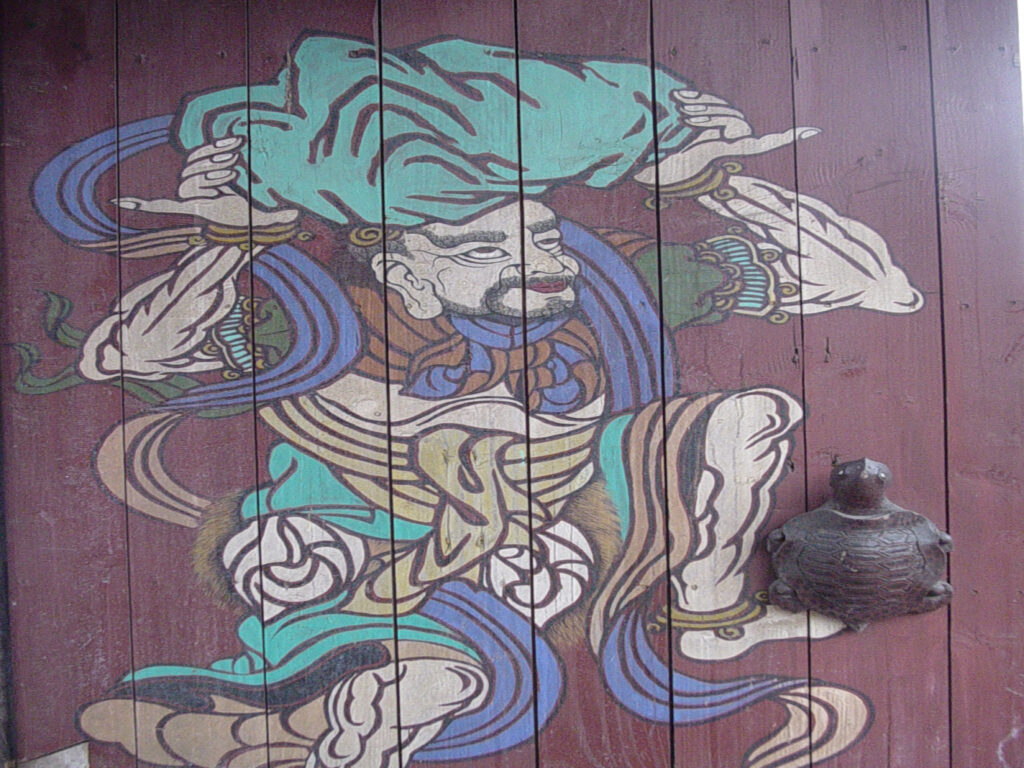
It was my wish to make a collection of all the animals I could find and get away as soon as possible, for by this time I was convinced that Quelpart was afflicted with a most wretched climate. This resolve was made with a will, and I worked hard, but although the weather improved somewhat after we had been in Quelpart a month, I had hard luck before me. I was taken with a short but serious illness, and another boil came, this time on my foot, making it almost impossible for me to draw on my boot. To go without footwear was out of the question in this country of rocks. But in spite of my sickness, I went on with my scientific work as well as I could. Ichikawa was industrious in making a collection of insects, and I hunted and trapped for the birds and mammals. Of the birds I secured a good many species, mostly like those found in Japan; of the mammals I could catch but two kinds, a wild mouse with a black stripe down the its back (Apodemus agrarius), and a weasel of dark color, which proved to be a species theretofore unknown (Lutreola quelpartis.)
The first time the weather looked sufficiently settled, I took my shotgun and went bird hunting. I started out without any goal, but when I had ascended the side of the canyon, I discovered a long sweep of grassland which seemed to reach almost to the summit, and this caused me to make an attempt to climb the mountain. The slope was easy, and I strolled along, trying to shoot certain small birds that continually eluded me. Suddenly I encountered a strong wind and the fog began to drift about the mountain. I hastened then, still thinking it possible to gain the summit, but soon I began to see cliffs ahead, and the fog was gathering so rapidly that I decided to turn back. I had nearly reached the head of the great canyon and could see that it began at the foot of a high precipice, the top of which seemed to form one of the highest parts of Hal-la-san. I had been following the eastern edge of the canyon, but now in order to see more of the mountains as I returned, I crossed, with much labor, to the western side. By the time this was accomplished, the storm broke with great fury. I was in the very cloud when it burst, and the flash of lightning and crack of thunder came simultaneously. I was fearful that my gun would attract the lightning, but there was no rock or tree sufficient to shelter me.
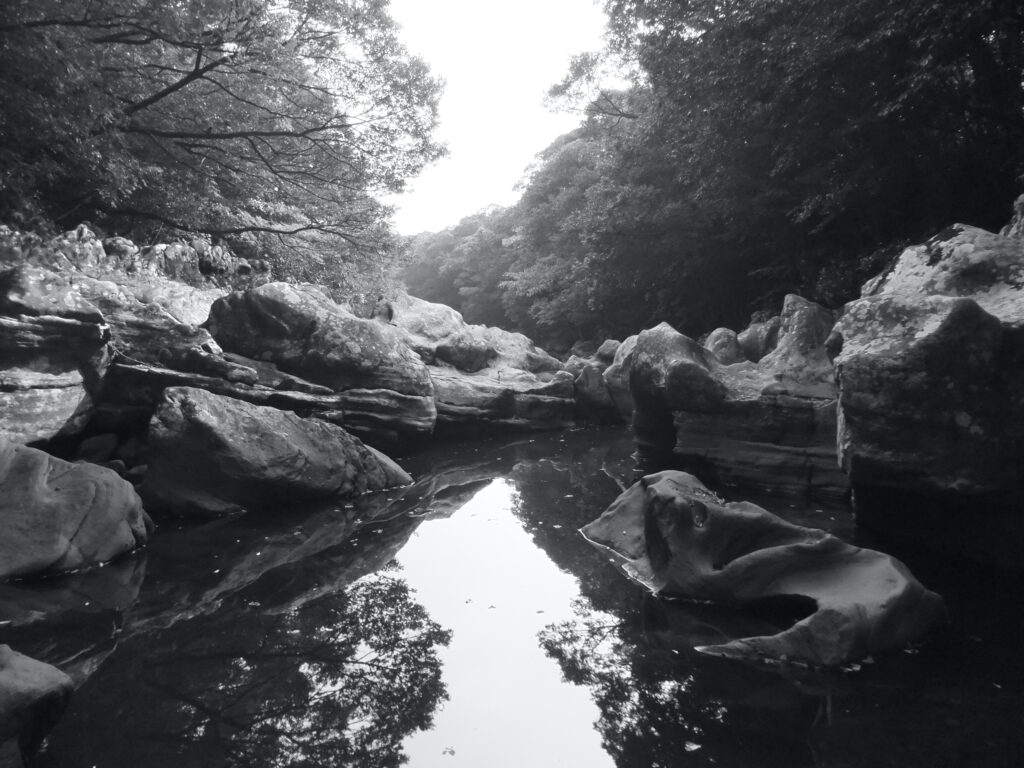
Rain fell in an amount that I have seldom seen equaled. Every little depression in rock and soil became a water course, and the stream in the canyon below me began to roar. Absolutely drenched to the skin, I made my way toward camp, but going was not easy for the western edge of the canyon proved more densely wooded than I had found the eastern, and for an hour or more, while the storm still raged, I crawled along under low thorny bushes. At last I reached the bottom of the large canyon near our tent. The stream bed, which had been dry when I started, was now a great torrent, which I feared I could not cross. However, by selecting the best place, and using a heavy pole for a brace, I managed to walk across on of large stones that were not very deeply flooded. Thus I got back to camp, after an unsuccessful, but thrilling experience.
One afternoon toward the close of my stay, I took a blanket, my rifle and some food and went up toward the highest part of Hal-la-san. I camped in a clump of firs and yews in the gorge not far below the high precipices in which it terminates. The next day I arose before daylight, and after a hurried breakfast, climbed to the east side of the gorge. As the wind blew from the mountains, I proceeded in that direction in search of deer. Still-hunting proved next to impossible, however, for the forest at this altitude (5,000 feet), though stunted, was very thick and composed chiefly of firs with stiff branches so close to the ground that it was not easy to crawl beneath them. I found deer tracks, but the animals eluded me. As daylight grew strong, I ceased hunting and pushed on up through the forest to the summit. The dwarf trees extended nearly to the edge of the crater in the northeastern slope. On the other sides it did not come near the summit at all, but was separated by a wide area of large broken rocks, covered with moss and lowgrowing plants, among which I noticed heather. On the south the mountain rose in great precipices, and their topmost crags formed part of the crater wall. The basin-like crater was about four hundred feet in diameter, and possibly two hundred feet deep. It showed no signs of activity, but from a geologist’s point of view, it was new. It contained a small, shallow lake, and cattle, of which a few had found their way up there, fed upon its grassy bottom. The highest part of the mountain, 6,558 feet above the sea, was formed by some peaks in the northwestern side of its crater wall.
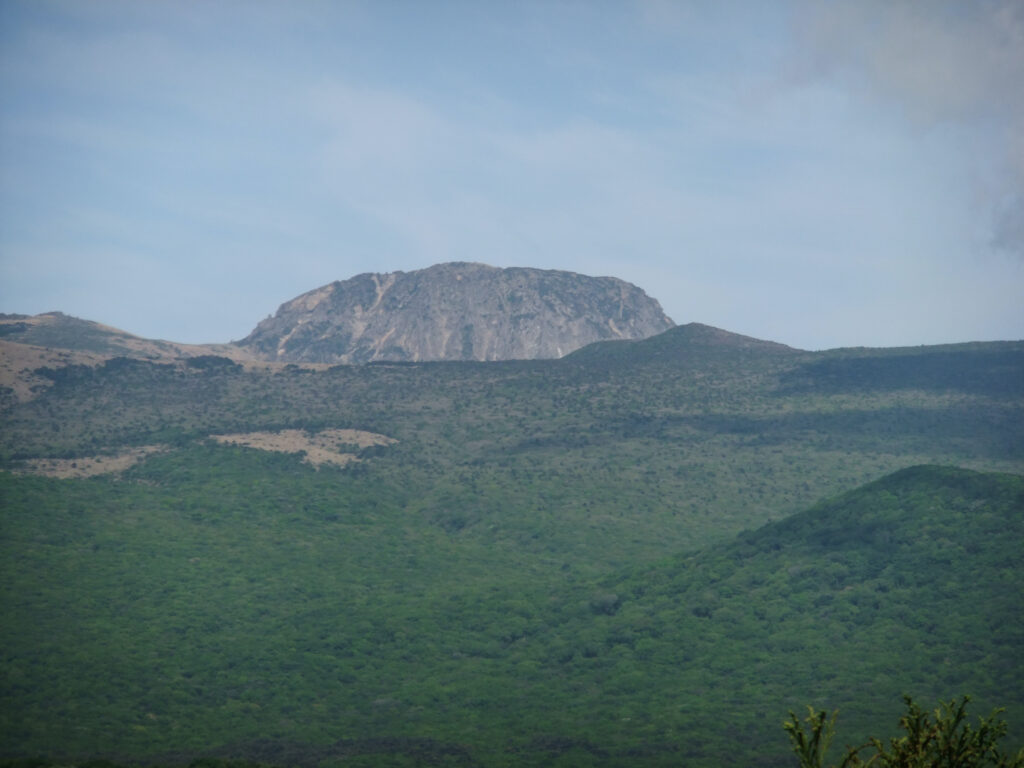
I paused to view view the land and sea below me. On south and west all was foggy, and the blowing clouds threatened to envelop me at any minute. I could see those parts of the island to the northward and eastward well. Beyond the long and gradual slopes of Hal-la-san the cultivated fields were distinguished by the stone walls that enclosed them. Nearer, the broad sweep of pasture land stretched along the northern side, but in the east this belt seemed to be lacking. There the forest extended much lower than elsewhere, and the fields came up to meet it.
Looking eastward, I counted above fifty small, isolated cinder cones in the lower part of the island; they formed, indeed, the most striking feature of the landscape. Each was a small volcano with a crater in its top. A great number of streambeds led down from the mountain with bewildering irregularity. I was told that they were most all quite dry, except when rained. I tried to return to camp by descending on the westward, but there was much so fog that I could not see where I was going, so for fear of getting among cliffs, I retraced my steps, crossed through the crater, which I had previously circled on the south, and descended to my little camp in the clump of firs.
After forty days’ sojourn in Quelpart, thirty of which had been stormy or foggy, I again boarded the little old steamer and went back to Mokpo. The day was quiet, the sun bright, but one small cloud hung near the summit of Hal-la-san.
The Mountain spirit was at last appeased.
